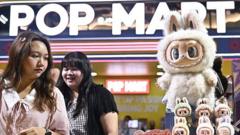Beijing-based Pop Mart, the pioneer of the viral Labubu dolls, is projecting a remarkable profit increase of at least 350% for the first half of 2024, as revenues have seen more than a threefold increase. Valued at over $40 billion on the stock market, the toy firm attributes its soaring profitability to enhanced brand recognition across the globe and effective cost control measures.
The whimsical Labubu dolls, characterized by their elf-like appearance and notable jagged teeth, have taken the toy market by storm. Their unique marketing strategy, known for utilizing “blind boxes,” has faced some criticism for promoting compulsive buying behaviors similar to gambling. Launched in 2019, Labubu has rapidly established Pop Mart as a significant player within the toy retail space, with over 2,000 vending machines and storefronts worldwide.
Pop Mart made its stock market debut on the Hong Kong Stock Exchange in 2020, and its valuation has skyrocketed nearly 600% within the past year. Remarkably, sales outside mainland China now account for nearly 40% of the company's revenue. The overwhelming consumer interest in Labubu dolls has even forced numerous retailers to temporarily halt sales due to insatiable demand.
In June, Labubu's sales in the United States surged by an astonishing 5,000% year-on-year, greatly aided by endorsements from high-profile celebrities such as Kim Kardashian and Lisa from K-pop sensation Blackpink. According to Vinci Zhang, a senior analyst at M Science, the toy company possesses enormous potential in the U.S., where it currently operates about 40 stores, significantly fewer than the approximately 400 located in China.
The fervor surrounding Labubu dolls has birthed a passionate resale market; dolls originally priced around $10 can now command prices of hundreds or even thousands of dollars. A striking instance occurred in June when a one-of-a-kind human-sized Labubu sold for a staggering $150,000 at an auction in Beijing.
However, the dolls' acclaim has also led to a surge in counterfeit versions, branded as Lafufu dolls. In response, Chinese authorities have launched a crackdown, seizing over 46,000 fake Labubu toys during June alone, as they combat the burgeoning black market that threatens the authenticity of the beloved figurines.





















